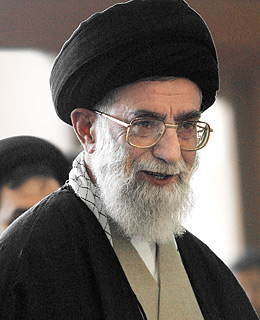
Ayatullah Ali Khamenei
The intimates of Ayatullah Ali Khamenei, the Supreme Leader of Iran, call him "the great balancer." They could as easily call him "the great hedger." The reticent cleric refuses to make peace with the West but eschews open confrontation. He obstructs democratic reform but holds the country's most hard-line radicals in check.
Despite his allegiance to the status quo, Khamenei, 67, has emerged as one of the most pivotal, if enigmatic, leaders in the Middle East. The Iranian constitution vests the Supreme Leader with divine right to rule. His willingness to negotiate about Iran's nuclear program will determine whether his country's dispute with the U.S. and its allies is resolved peacefully or through military confrontation. Though Khamenei is thought to be more pragmatic than Iran's elected President, Mahmoud Ahmadinejad, he has also cast nuclear power as an issue of national pride. What remains to be seen is whether "the balancer" will be willing to bargain away Iran's nuclear prerogatives, and at what price.